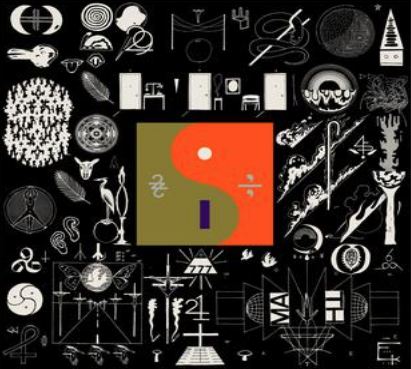Bon Iver’s “22, A Million” Review

“22, A Million” was released September 30 to much critical acclaim
Bon Iver- a once-underground indie-folk project with a difficult name to pronounce (bohn-ee-VAIR)- has steadily been working towards ‘household name’ status, largely thanks to smash hits such as “Skinny Love” and “Holocene”. Justin Vernon’s crooning falsetto may be one of the few voices that packs a sense of nostalgia its tone alone. This, combined with effortlessly artful instrumentation, has won over the hearts of all who have ever fantasized about starring in a solemn film of their life, or experienced the cinematic beauty of a sunset-lit landscape from a speeding train.
The project was conceived in 2007, when Vernon- beaten down from the frustrations of an unavailing career and personal life- fled to a cabin in the deep woods of Wisconsin, where he spent a full winter in isolation writing and recording the songs that had been welling inside him. The result was an unexpected yet resounding success. Soon after followed a self-titled release- an expansion of the same melancholy captured in For Emma, Forever Ago– and after a four year hiatus, Bon Iver’s most recent, and perhaps most anticipated work- 22, A Million.
The first things one may notice about the album are the strange symbols filling the cover, and the peculiar song titles, containing a combination of numbers, letters, and other characters. Even in the pre-release stage, with only the tracklisting available to the public, it was apparent that Vernon was stepping away from minimalistic folk, and pulling audiences along with him into uncharted territory. This presumption turned out to be equal parts true and false. On the surface, the album is dominated by unconventional and unfamiliar production methods involving the use of heavily-layered autotune and vaguely technological-sounding instrumentation; yet, contrary to much music of this sort, it is all instantly and effortlessly pleasing to the ear. This is because the songs at their core are purely Bon Iver, which is to say purely potent, sentimental, dynamic, delicate, and well-constructed. Like an exceptional painting housed in an avant-garde frame, the production on this album in no way compensates for a lack of substance; it enhances the most beautiful aspects of each song by highlighting them in ways previously unheard.
In a word association exercise, one might respond to “autotune” with “fraud”. Indeed, I never anticipated that I could be deeply moved by layers of effect-laden a capella vocals, but “715 – CRΣΣKS” has set a new standard in making art out of something traditionally used to escape art. A strikingly honest story is told, without support from inhuman voices, through the dishonest mask of vocal alteration. This duality is exemplified across the entire album, bordering on sincere disjointness, or a decision that can’t quite be made.
The art of the “unfinished masterpiece” is becoming quite popular, and 22, A Million undoubtedly earns a spot in this category. Each song introduces a new sonic concept, develops it to a breaking point of emotional intensity, and then quickly withdraws back into the bustling abyss of contemplation. While some might deem it lazy to release a collection of underdeveloped songs far-from-seamlessly stitched together, this is perhaps the truest representation of human consciousness. Moments of genius inspiration are fleeting, and the weight of life becomes a reality all at once, and then not at all. This album is a window into these moments. The space of each song is dense enough to inspire and intrigue, yet sparse enough allow the gaps to be filled in by each individual’s own experiences. At just 35 minutes in length, it is palatable in one sitting, and leaves the listener grasping for closure as the soulful final track “00000 Million” disappears without a thorough goodbye.
Criticisms such as these are more often negative than positive, but they are the same that could be applied to life as a whole. If the purpose of music is to mirror the way our world works, 22, A Million, is music in the truest sense- not perfect, but confusing, incomplete, uncertain, and beautiful. The symbols smattered across the cover may not declare any definitive meaning, and that’s ok.
